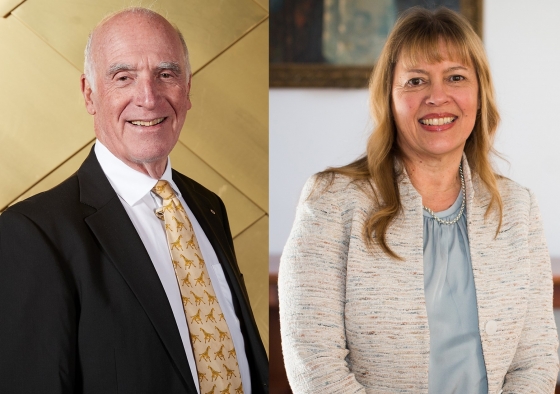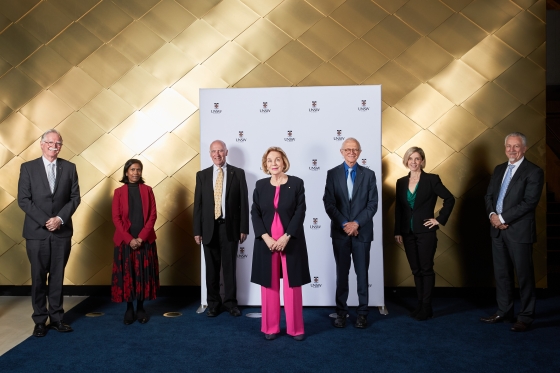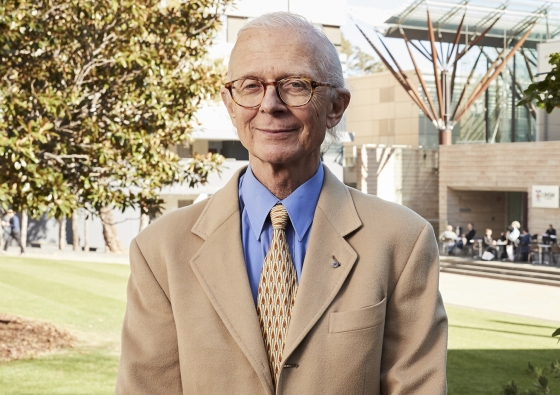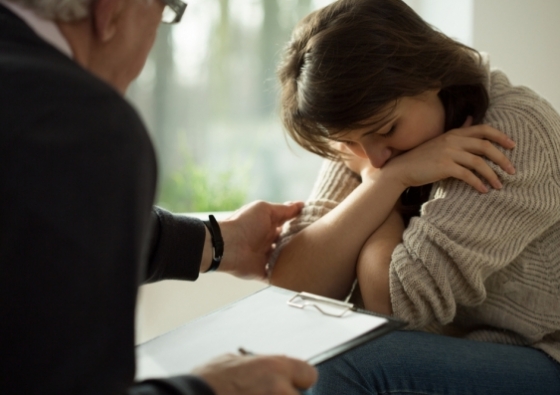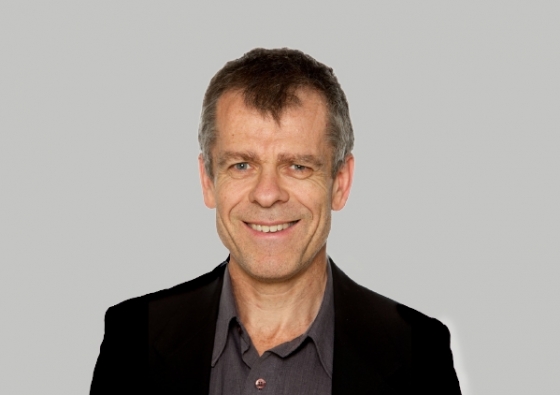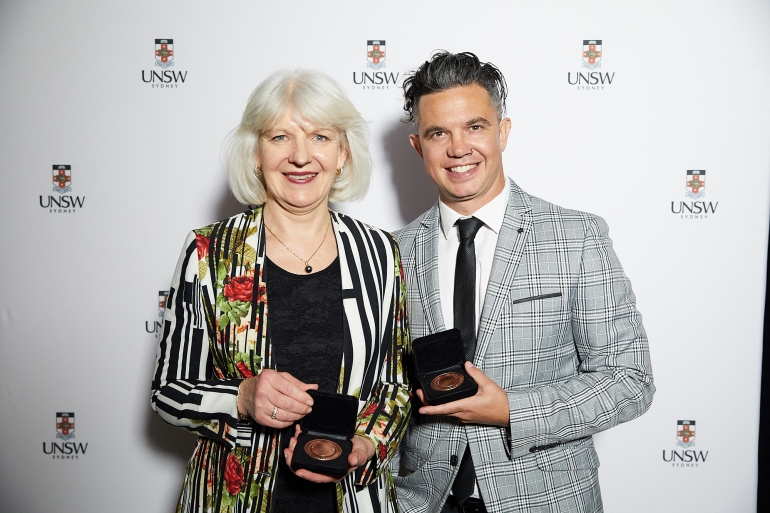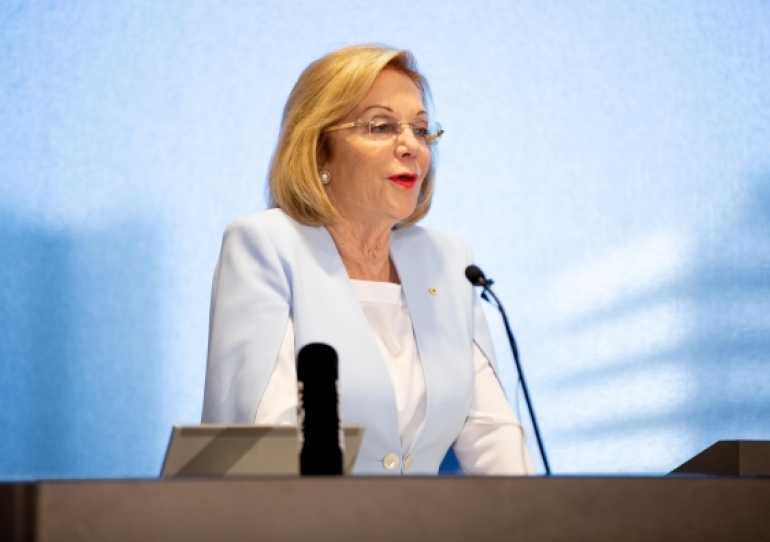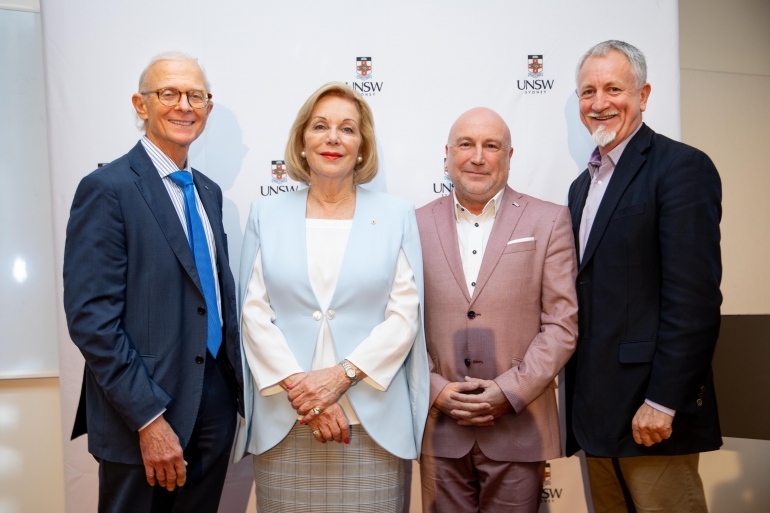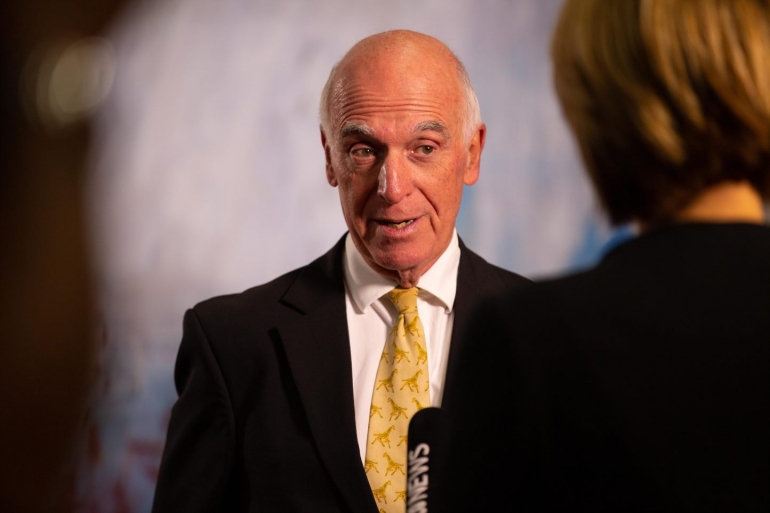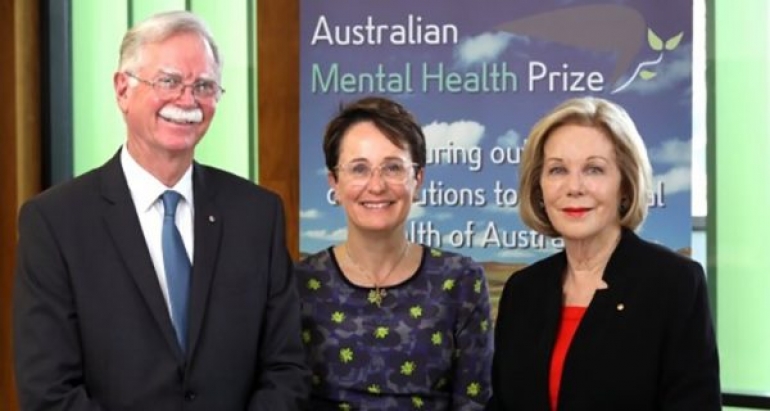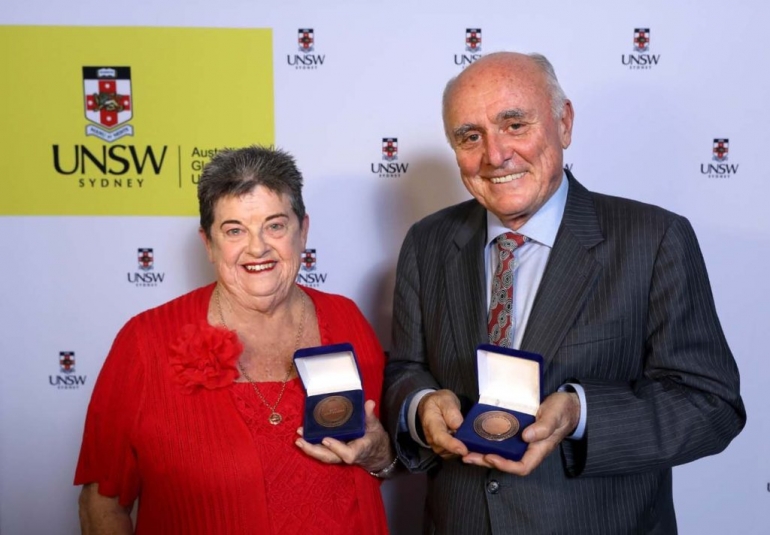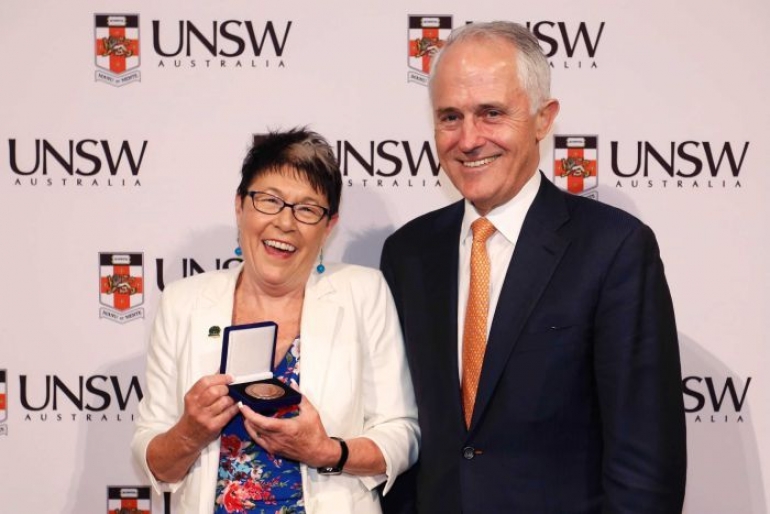5 November
Two outstanding winners awarded Australian Mental Health Prize
Source: Yolande Hutchinson and Julia Jones, UNSW Newsroom
Scientia Professor Gordon Parker and Professor Helen Milroy are winners of the 2020 Australian Mental Health Prize.
Dual winners of the 2020 Australian Mental Health Prize were announced this evening, recognising two exceptional advocates who represent the important work being done to improve mental health across the country. The Governor-General, David Hurley, presented the winners with their awards during an online ceremony held at UNSW Sydney.
The 2020 winners of the award are Scientia Professor Gordon Parker, founder of the Black Dog Institute and Scientia Professor of Psychiatry, UNSW Sydney, and University of Western Australia Professor Helen Milroy, whose work and research has had a lasting impact on children’s mental health, combining Aboriginal and western knowledge in mental health education.
Prof. Parker and Prof. Milroy were chosen from an exceptionally strong field of seven finalists for the prize, now in its fifth year. The prize is supported by UNSW, through its School of Psychiatry.
Ita Buttrose, Chair of the Australian Mental Health Prize Advisory Group, said: “The Australian Mental Health Prize is a well-established platform to recognise those making a significant contribution to mental health nationally. In this especially challenging year, it is more important than ever to highlight the diverse and deeply compassionate work being undertaken.”
Scientia Professor Henry Brodaty, UNSW School of Psychiatry, said: “The Australian Mental Health Prize is a wonderful way to shine a light on those who dedicate so much of themselves to improving our approach in the mental health sector. This year’s dual winners, Gordon Parker and Helen Milroy, are perfect examples of Australia’s impressive talent working in this area. We should be proud of their achievements.”
Prof. Gordon Parker
Gordon Parker is one of Australia’s foremost psychiatrists. He founded the Black Dog Institute and is Scientia Professor of Psychiatry at UNSW. His research priority has been to define differing mood disorders with high precision and to determine the effectiveness of differing therapies for separate conditions, a model challenging the current ‘one size fits all’ approach.
“I am honoured to have been selected as a dual winner of the Australian Mental Health Prize. The prize has an important role in highlighting work being undertaken in the mental health sector,” Prof. Parker said.
“In observing my career over the decades, my work has always had a focus on ‘What is the correct diagnosis?’ When I entered psychiatry, I was struck by how many practitioners did not judge making a diagnosis important. Yet it is important for patients to know what is wrong, if it is serious and how long it will last.
“If the right diagnosis is made then choice of treatment becomes more logical. I developed the Mood Assessment Program (MAP) where patients enter data and the computer generates diagnoses and best treatment options. There are now over 5000 MAP providers in Australia with an 80 per cent accuracy rate in differentiating the two key depressive types and in identifying a bipolar mood disorder. Machine learning techniques adopted this year have improved accuracy rates even further in pilot studies.
“Diagnosis is extremely important in psychiatry and new artificial intelligence approaches have the potential to deliver highly accurate diagnoses to inform practitioners and their clients,” he said.
Prof. Helen Milroy
Helen Milroy is the Stan Perron Chair of Child and Adolescent Psychiatry at the Perth Children’s Hospital and University of Western Australia, and Honorary Research Fellow at Telethon Kids Institute. She is passionate about children’s mental health and combining Aboriginal and western knowledge systems in mental health education.
“I am very honoured and humbled to be a co-winner of this year’s Australian Mental Health Prize alongside my esteemed colleague Prof. Parker. I would like to thank the Prize Advisory Group and UNSW for making this award possible. I hope we can continue to shine a light on mental health and what else needs to happen to bring about the wellbeing of our nation, and especially that of our First Peoples,” Prof. Milroy said.
“I am particularly keen to highlight the needs of our children and the many difficulties and challenges they face, particularly during these most unprecedented times. As I think back about how my life and work has changed, I am mindful of the ‘new normal’ we are now entering into and just what this means for the wellbeing of our children.
“I have learnt so much and continue to learn from the many children, families, communities and colleagues I have worked with and shared the heartbreaks and joys with along the way. Children are no more immune to mental health challenges than the rest of society, yet they are easily overlooked or thought to be resilient.
“I believe Australia’s greatest hope for the future rests in the potential of our children. I look forward to a greater focus and investment in our children, their family and community. I hope we can feel proud when we look back, knowing we did everything to give children the opportunity to thrive, to support them when they faltered and to make sure they receive the most comprehensive and well-resourced mental health services available. That would be something to celebrate.”
The Australian Mental Health Prize was established in 2016 by UNSW Medicine's School of Psychiatry, Australia’s pre-eminent psychiatric research department. It recognises outstanding Australians who have made major contributions to either the promotion of mental health, or the prevention and treatment of mental illness.
1 October
Seven mental health champions named finalists for top prize
Source: Yolande Hutchinson and Julia Jones, UNSW Newsroom
The Australian Mental Health Prize shines a light on the selfless work of individuals making a difference in the area of mental health.
Seven outstanding finalists have been selected for the 2020 Australian Mental Health Prize. The Prize, now in its fifth year, recognises Australians who have made outstanding contributions to the promotion of mental health or the prevention and treatment of mental illness.
This year’s winner will be announced by the Governor-General, His Excellency General the Honourable David Hurley AC DSC (Retd), at a ceremony at UNSW Sydney on 5 November 2020.
The finalists include a broad spectrum of Australians who have dedicated their lives to improving the mental health and wellbeing of people and communities across the country.
“The Prize showcases world-class contributions that have enhanced mental health in Australia. Each finalist announced today has worked selflessly to improve the lives of those experiencing difficulties with mental health,” said Ita Buttrose, Chair of the Australian Mental Health Prize Advisory Group.
The breadth of this year’s finalists demonstrates the diverse and deeply compassionate work being undertaken in many challenging areas: improving the care of people with mental illness in the criminal justice system, promoting positive mental health in the performing arts industry, helping bring forward empathetic policy directions that support people experiencing mental distress, enhancing child and adolescent mental health, supporting the Aboriginal medical workforce and advancing Indigenous health and mental health.
“In this especially challenging year, we as a community are even more mindful that mental illness can affect any one of us. The finalists announced today have helped our society by their efforts, creativity and dedication to achieving better mental health in Australia,” said Scientia Professor Henry Brodaty, from UNSW Medicine’s School of Psychiatry.
“It is wonderful to see so much progress being made in this area.”
Australian Mental Health Prize 2020 finalists
Ms Claire Spencer AM, Melbourne, Vic
Arts Centre Melbourne CEO, Claire Spencer AM, has made an outstanding contribution to the promotion of positive mental health in the performing arts industry. A chartered accountant with a Masters in Theology, she has steered the Arts Centre Melbourne towards increased social impact and sustainability, and recently through the COVID-19 emergency. Under her guidance and support, the Arts Wellbeing Collective (AWC) was established by Arts Centre Melbourne in 2017 in collaboration with the performing arts sector. The AWC is an initiative that comprises a consortium of arts and cultural organisations working together to promote positive mental health and wellbeing in the performing arts. This is a tailored solution, with the intention of addressing the very significant challenges to mental wellness that working in the performing arts represents at an individual, company and sector level.
The AWC has since won the ‘Martin Seligman Health and Wellbeing Award’ at the 2019 Australian HR Institute Awards, has been a finalist in the VicHealth Awards ‘Improving Mental Wellbeing’ in 2017, 2018, 2019, and at the Australian HR Awards ‘Best Health & Wellbeing Program’ in 2017. Claire is a Board member of the Pinnacle Foundation and a member of Chief Executive Women. In 2020 she was recognised with an Order of Australia (AM) for services to the arts and community.
Dr Gerry Naughtin, Cheltenham, Vic
Gerry Naughtin blends his commitment to social justice for people experiencing mental distress with his bureaucratic skills to help bring sensitivity and sensible empathetic policy directions that support people on their recovery journeys. His work has focused on improving the psychosocial wellbeing of Australians with significant mental health challenges. Currently, as Strategic Advisor Mental Health in the National Disability Insurance Agency (NDIA), he plays a leadership role in the rollout of the National Disability Insurance Scheme (NDIS), the largest reform of psychosocial disability support services in the country’s history.
Gerry has worked extensively with mental health consumer and carer organisations, Mental Health Australia and a broad range of stakeholders in listening to feedback and making recommendations to the NDIA and government to improve the Scheme for people with mental health challenges. He is recognised for his expertise in creative and strategic mental health policy development. He chairs the NDIA National Mental Health Sector Reference Group that brings together national stakeholder groups and Commonwealth government agencies, and is a member of the Expert Advisory Committee to the Royal Commission into Victoria’s Mental Health System. Gerry was the Chief Executive of Mind Australia, delivering innovative psychosocial services across Australia. He was a member of the NDIS Independent Advisory Council, the Expert Advisory Group for the Mental Health Service Planning Framework and Mental Health Victoria Board.
Prof. Gordon Parker AO, Northwood/Randwick, NSW
Professor Gordon Parker AO is one of Australia’s foremost psychiatrists. He founded the Black Dog Institute and is currently Scientia Professor of Psychiatry, UNSW Sydney. For nearly two decades, he was Head of the School of Psychiatry at UNSW and Director of the Division of Psychiatry at Prince of Wales and Prince Henry hospitals. Known for employing innovative strategies to destigmatise mood disorders, including writing a successful play and a recent book of fiction, his research priority has been to define differing mood disorders with high precision and to determine the effectiveness of differing therapies for separate conditions, a model challenging the current ‘one size fits all’ approach that compromises management and clinical outcomes.
He was editor of the Royal Australian and New Zealand Journal of Psychiatry and inaugural psychiatrist surveyor for the Australian Council on Hospital Standards. He has published 20 books and more than 1000 scientific papers, and was awarded the 2004 Citation Laureate as the Australian researcher most highly referenced in the field of ‘Psychiatry/Psychology’, reflecting funding by the National Health and Medical Research Council for over 40 years.
Prof. Helen Milroy, Crawley, WA
Helen Milroy is the Stan Perron Chair of Child and Adolescent Psychiatry at the Perth Children’s Hospital and University of Western Australia, and Honorary Research Fellow at Telethon Kids Institute. She is a Commissioner with the National Mental Health Commission, Chair of Gayaa Dhuwi Proud Spirit Australia, Co-Chair of the Million Minds Medical Research Advisory Group, and in 2019 was appointed the AFL’s first Indigenous Commissioner. From 2013 to 2017, Helen was a Commissioner on the Royal Commission into Institutional Responses to Child Sexual Abuse. She is a descendant of the Palkyu people of Western Australia and has always had a strong interest in health and wellbeing, especially for children.
Helen is recognised as the first Indigenous Australian to become a medical doctor, completing medical studies and specialist training in child and adolescent psychiatry. She is passionate about combining Aboriginal and western knowledge systems to improve outcomes. Her work and research in the areas of holistic medicine, child mental health, recovery from trauma and grief, application of Indigenous knowledge, and cultural models of care have made a significant difference to the lives of children and young people, particularly those with a trauma background. Her efforts in developing and supporting the Aboriginal medical workforce and cultural safety in health and mental health through curriculum development, education and training, implementation and evaluation, has had a lasting impact on Aboriginal health and mental health across Australia.
Prof. James Ogloff AM, Alphington, Vic
For more than 35 years, Professor James Ogloff AM has played an integral role in identifying, advocating, and improving the care of people with mental illness in the criminal justice system. He has continuously worked as a clinical forensic psychologist in service development and leadership positions, as a prolific academic and mentor, and as a trusted advisor and advocate to government in matters at the crossroads of mental health and the law. Trained as a lawyer and psychologist, he is a leading international expert in forensic mental health – a traditionally under-recognised area of mental health. He has worked tirelessly on a national and international level to first, identify the existence and extent of mental health requirements in prison and forensic settings, and second, to address how those needs can be met.
He is a Distinguished Professor and Director of the Centre for Forensic Behavioural Science, operated by Swinburne University and Forensicare, where he is Executive Director of Psychological Services and Research. He has held leadership positions in peak professional bodies in Australia and overseas. He has published 18 books and more than 300 articles and chapters.
Mr John Brogden AM, Bilgola NSW
John Brogden AM has been the Chairman of Lifeline Australia since 2012 and on the Board since 2009. As one of Australia’s leading politicians and now a business leader, John is living proof that even from the darkest places, there is a way back. While John has reached the highest levels in his professional career, his personal journey is one of highs and lows, strength and courage. In 2005, John survived a very public suicide attempt that saw him leave politics and move to the business world as a CEO. John has worked tirelessly to create awareness of the importance of suicide prevention, encouraging Australians in crisis to seek help and not face their darkest moments alone.
Under John’s leadership, as Chairman of Lifeline since 2012, Australians are turning to Lifeline in greater numbers than ever in its 57-year history. The 13 11 14 crisis line now receives 90,000 calls a month – supporting Australians at risk of suicide more than ever during the COVID-19 pandemic.
Mr Keith Wilson, Freemantle WA
Keith Wilson is a former Western Australian Minister of Health and former chair of the Mental Health Council of Australia. He has been involved in ongoing mental health advocacy through membership of non-government agencies such as WA Association for Mental Health, the Mental Illness Fellowship WA, Carers WA, and the Learning and Attentional Disorders Society of WA. Keith was a member of the Board of St John Health Care for 10 years. He was awarded the Centenary Medal (2001) for service to people with a mental illness and their carers.
He is also a Member of the Order of Australia (2009) and is a director of Meeting for Minds – a not-for-profit company promoting research into the brain and mental illnesses through the partnering of researchers, clinicians and people with lived experience of mental illness in research. Keith is a powerful voice promoting the cause of mental health not only in Australia but globally. He is inspired in his work by his adult son, Daniel, who lives with chronic, lifelong schizophrenia. Keith is the primary carer for his son.
The Australian Mental Health Prize was established in 2016 by UNSW through its School of Psychiatry, Australia’s pre-eminent psychiatric research department within UNSW Medicine. It recognises Australians who have made outstanding contributions to either the promotion of mental health, or the prevention/treatment of mental illness.
23 July
Australia’s Health 2020 report shows one in five Australians have a mental health condition
Source: UNSW Newsroom
Mental health statistics in NSW highlight the importance of the Australian Mental Health Prize to reduce stigma and recognise mental health workers.
A new report released today by the Australian Institute for Health and Welfare (AIHW) confirms how widespread mental illness is in Australia.
“The mental health sector is an extremely important part of Australian society, and we want to hear about these unsung heroes so their contribution to mental health can be publicly recognised in the Australian Mental Health Prize,” said Ita Buttrose AC OBE, Chair of the Australian Mental Health Prize Advisory Group said.
The Australia’s health 2020 report shows one in five Australians reported they had a mental or behavioural condition in 2017-18.
“We expect the impact of COVID-19 will see a further increase in these figures, so it is more important than ever to publicly acknowledge mental health and those that work in the sector through the Australian Mental Health Prize,” Scientia Professor Henry Brodaty from UNSW Medicine and Advisory Board member of the Australian Institute for Health and Welfare said.
One of the data sources for the report, the Australian Bureau of Statistics’ (ABS) National Health Survey 2017-18, shows that NSW rates were similar to that of Australia: one in five people experienced mental and behavioural conditions. In NSW one in eight people had an anxiety-related condition and almost one in 10 people had depression or feelings of depression.
Nominate someone for the Australian Mental Health Prize
Ms Buttrose believes the findings reinforce the importance of removing the stigma associated with our mental health and recognising the great work that is being done by mental health experts and teams around Australia.
“The Australian Mental Health Prize helps support mental health workers, as well as those living with a mental health condition, and ensuring mental health stays top of mind in the community,” Ms Buttrose said.
“We encourage clinicians, health professionals, community groups and individuals to nominate people whom they feel are making a real difference in the area of mental health research, advocacy or service delivery for the 2020 Australian Mental Health Prize.”
According to the report, females reported a higher proportion of mental or behavioural conditions than males. Twenty-two per cent of females reported a mental health condition compared to 18 per cent of males.
Overall, respondents in the 15 to 24 age group reported the highest level of mental health conditions, with more than one-quarter (26 per cent) of this age group reporting having mental health issues.
Now in its fifth year, the Australian Mental Health Prize was established by UNSW through its School of Psychiatry and recognises Australians who have made outstanding contributions to the promotion of mental health or the prevention and treatment of mental illness.
To enter, you simply need to provide 200 words outlining the work being undertaken by the person you are nominating and how it is making an impact. Nomination forms can be obtained from the website. Nominations for the Australian Mental Health Prize close on 30 August.
The Australia’s Health 2020 report is based on the most recent national statistics on mental health gathered by the federal government during the year leading up to June 2018.
Read the original article
29 April
Launch of 2020 Australian Mental Health Prize
29 April
UNSW Professor launches 2020 Australian Mental Health Prize
Source: Yolande Hutchinson, UNSW Newsroom
UNSW Professor says the hidden threat from COVID-19 is long-term mental health issues.
Australia’s mental health system will need to be prepared to deal with long-term mental health issues resulting from the COVID-19 pandemic.
This was the message from Professor Richard Bryant AC, UNSW Sydney Scientia Professor, delivered when he launched this year’s Australian Mental Health Prize today via an online forum.
The prize, now in its fifth year, recognises Australians who have made outstanding contributions to the promotion of mental health or the prevention and treatment of mental illness.
“The COVID-19 pandemic is causing unprecedented pressures on people around the world. Apart from the anxieties of infection, people are experiencing considerable stress arising from changes to work structure, unemployment, financial pressures, schooling, concern for family and the elderly, and social isolation,” Professor Bryant said.
“Prior pandemics such as SARS have shown that mental health issues spike during the outbreak, and more worryingly, can lead to longer-term problems well beyond the pandemic itself,” Professor Bryant explained.
“We need to remember that the hidden threat from COVID-19 is the long-term mental health effects resulting from economic downturns, with many people losing jobs, reduced income, and suffering poor financial security.
“These pandemics also highlight there are some groups who are especially vulnerable to mental health problems during and after a pandemic, including health workers, those in quarantine, and those infected.”
Professor Bryant said that many strategies can be employed to manage mental health in the context of COVID-19.
“It is important to note that many of the stress reactions many of us experience during the pandemic are not necessarily a mental disorder but rather reflect understandable stress reactions to a severe situation. In this sense, many of the strategies that can be used at this time are those used to help people cope with ongoing stressors rather than mental disorders.”
Professor Bryant pointed out that the spike in mental health issues arising from the COVID-19 crisis will also require new strategies and treatment formats.
“Health systems are being developed and implemented around the world to try to provide mental health services to hugely increased numbers of people. These services need to adopt innovative treatment formats to accommodate social distancing, potentially large numbers of people requiring help, and targeting people who traditionally do not seek mental health assistance.”
Recognition for mental health sector
Scientia Professor Henry Brodaty from UNSW Medicine agrees with Professor Bryant’s comments and believes it is more important than ever to publicly acknowledge and address the unprecedented levels of mental health issues that will arise from the COVID-19 crisis.
“The mental health sector will need to adapt to the changing environment we are all currently living through. It is imperative that we acknowledge and celebrate the dedication and work of the mental health sector in assisting Australians through these difficult times,” Professor Brodaty said.
“Mental illness is something that affects our whole community, and the Australian Mental Health Prize is a valuable way to highlight progress being made in this space.”
Professor Brodaty said it was important for those working in the mental health sector to recognise the progress our colleagues are making in research and improving patient outcomes.
Chair of the Australian Mental Health Prize Advisory Group, Ita Buttrose, said the prize is helping to improve mental health care in Australia and ensures mental health stays top of mind for Australians.
“I have no doubt that the Australian mental health system will rise to the challenge and support Australians through the COVID-19 crisis,” Ms Buttrose said.
“I look forward to discovering who the winner of this year’s prize is and learning more about some of the world-class work being done in the field of mental health.”
UNSW Medicine places high importance on mental health research and works with many other mental health institutions and individuals in this area.
“We must recognise and acknowledge those individuals who are making headway in the area of mental health,” concluded Professor Bryant.
“We encourage clinicians, health professionals, community groups and individuals to nominate people whom they feel are making a real difference in the area of mental health research, advocacy or service delivery for the 2020 Australian Mental Health Prize.”
How to nominate
To enter, nominees must provide a CV and 200 words outlining the work being undertaken and how it is making an impact. Nomination forms can be obtained from: australianmentalhealthprize.org.au
Entries close on 30 August 2020.
29 April
Australia urged to plan for coronavirus mental illness wave
Source: Jenny Noyes, SMH
Mental health experts are warning the psychological impacts from coronavirus and the economic downturn will be felt for years, and say Australia needs to boost its capacity to handle a long-term uptick in depression, anxiety and other disorders.
Richard Bryant, Scientia Professor of Psychology at UNSW, and leader of the UNSW and Westmead’s Traumatic Stress Clinic, says much of the anxiety right now is an appropriate response to stress – but "as we go into next year when we can probably start to say the worst is over, there will be people with a persistent mental health problem".
Ahead of launching the Australian Mental Health Prize on Wednesday, Professor Bryant is calling for a nationally co-ordinated approach to managing the expected increase in long-term mental health problems, both from trauma directly related to the COVID-19 outbreak, and the economic repercussions to follow.
Read the full article.
